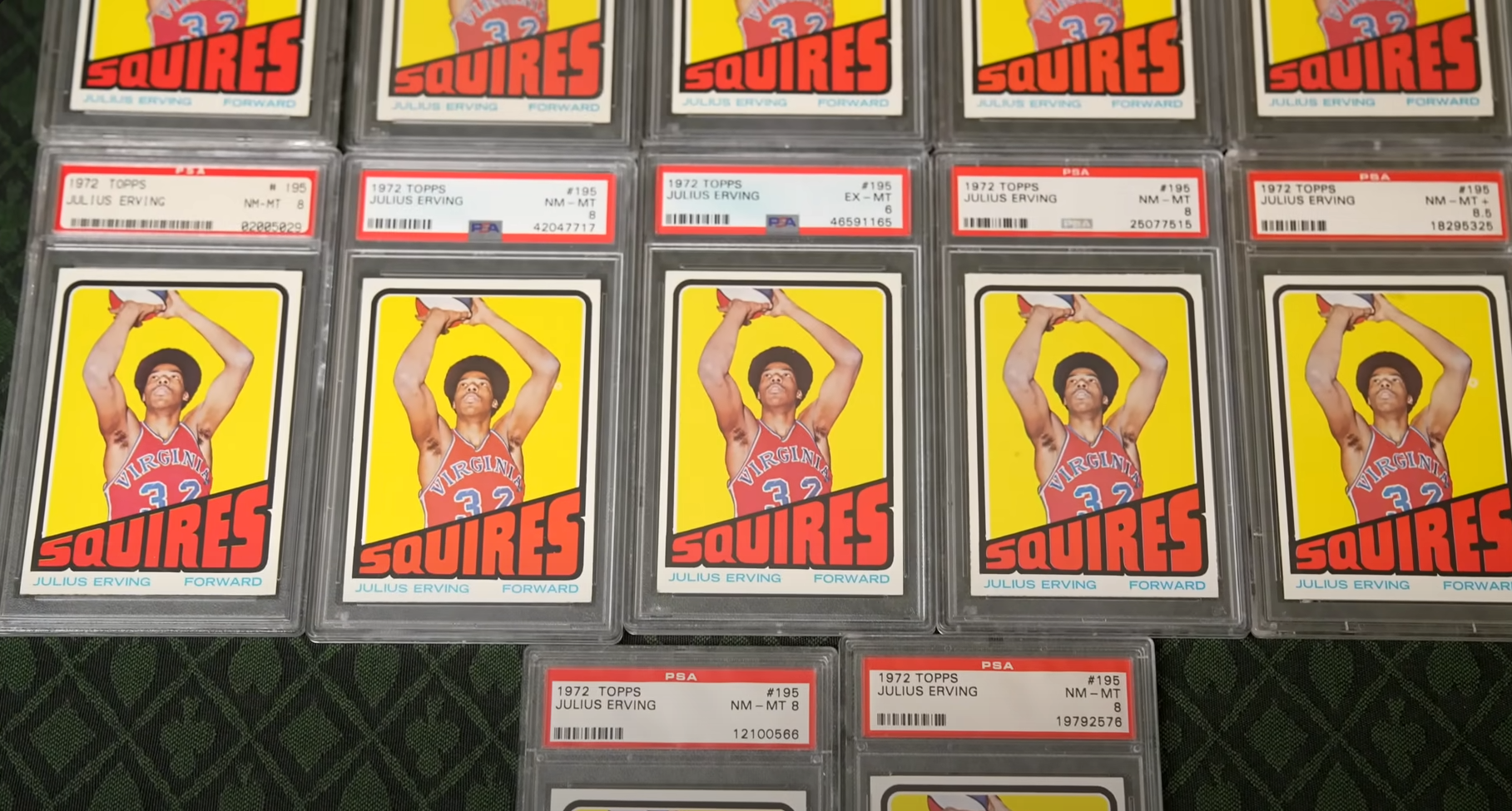In the world of basketball, few names resonate as deeply as Julius Erving, also known as “Dr. J.” His 1972 Topps rookie card represents the beginning of an era that forever changed the sport. This card not only symbolizes the start of a storied career but also serves as a cherished artifact that captures the extraordinary accomplishments of one of the greatest players in the game’s history.
The 1972 Topps Julius Erving Rookie Card
The 1972 Topps set introduced collectors to a bold design and vibrant colors, but none of the cards in the series were more coveted than Erving’s rookie card, number 195. The card features a young Erving in his Virginia Squires uniform, showcasing the team he played for before making his mark in the NBA. The simplicity of the design, with Erving mid-jump shot holding a basketball, is offset by the bright orange and yellow background, creating a visually striking piece of memorabilia.
Today, owning a high-grade example of this card is a prized possession for collectors. Its value has steadily risen, a testament to Erving’s lasting legacy and the deep sense of nostalgia for the era he defined. The desirability of this card is not solely based on its monetary worth but also on the profound impact Erving had on the sport.
Julius Erving’s Basketball Journey
Julius Erving’s basketball journey began in the American Basketball Association (ABA) with the Virginia Squires and the New York Nets before he eventually transitioned to the National Basketball Association (NBA) with the Philadelphia 76ers. His career accomplishments are nothing short of extraordinary. Known for his grace, athleticism, and creativity, Erving was a wizard on the court. He revolutionized the forward position and became an icon of the sport, inspiring a generation of players.
A Legacy of Achievement
Erving’s list of accolades is extensive: an NBA championship in 1983, two ABA championships, four MVP awards, and a total of 16 All-Star appearances in both the ABA and NBA. He was an innovator, influencing the modern style of play with his artistry and athleticism. Dr. J’s ability to soar through the air and captivate audiences with his flair and finesse made him one of the most exciting players to watch.
Hall of Fame Induction
In 1993, Julius Erving was rightfully inducted into the Basketball Hall of Fame, solidifying his status as one of the game’s all-time greats. His induction speech reflected on his journey, his love for the game, and his respect for the players who came before and after him. This honor served as a testament to the impact Erving had on the sport.
The Greatest Dunker of All Time
Even decades after his retirement, Erving is still celebrated as one of the best dunkers in the history of basketball. His slam dunks were not mere scoring maneuvers; they were artistic expressions that brought fans to their feet. Erving’s style and grace in the air transformed the slam dunk into a balletic spectacle, forever leaving his mark on the game.
The Cultural Influence of Dr. J
Julius Erving’s impact transcended the basketball court. He became a cultural icon, embodying coolness and professionalism both on and off the court. He was more than just a basketball player; he was a trendsetter, a role model, and an ambassador for the sport.
The Rookie Card as a Collectible
The significance of Erving’s 1972 Topps rookie card extends beyond the player it depicts. It represents a piece of history from a time when basketball was undergoing a transformation, with Erving at the forefront of that change. The card serves as a snapshot of the past, forging a tangible connection to the legacy of one of the sport’s greatest influencers.
The Investment Potential
As a collectible, Erving’s rookie card has demonstrated significant investment potential. Its value has consistently increased over the years, reflecting the growing interest in vintage sports memorabilia. Collectors and investors recognize the worth of owning a piece of history that holds both sentimental and monetary value.
Preserving the Card
For those fortunate enough to possess this card, preserving its condition is of utmost importance. Protective casing, proper storage, and occasional professional grading ensure that the card remains in optimal condition. Like all paper collectibles, the card’s state of preservation can significantly impact its value.
The 1972 Topps Julius Erving rookie card is more than just a piece of cardboard—it is a symbol of basketball’s rich history and the lasting impact of Dr. J. Collectors seeking out this card are not merely acquiring a sports memorabilia item; they are paying tribute to a player who redefined what it meant to be a professional basketball player. Erving’s legacy, enshrined in the Hall of Fame and in the hearts of basketball fans worldwide, will continue to live on. His rookie card serves as a lasting tribute to his remarkable career and contributions to the game.
For OTIA Sports, a prominent name in the sports memorabilia investment sphere, the 1972 Topps Julius Erving rookie card holds a special place of significance. It represents an investment that goes beyond financial gain; it is an investment in the legacy of a sport. The card’s steady appreciation in value is a testament to Erving’s enduring reverence in the annals of basketball history. OTIA Sports considers this card a cornerstone piece, exemplifying the blend of historical significance and solid market performance they seek in sports card investments. The Dr. J rookie card, with its rarity, demand, and cultural impact, remains a paragon of sports card collecting and a treasured highlight of OTIA Sports’ investment portfolio.

